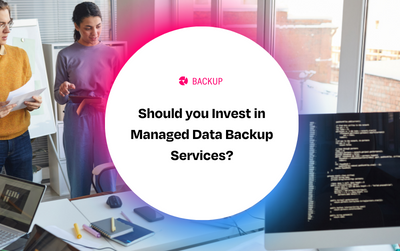Managed Data Backup and Minimising Downtime Costs
If the ever increasing role of technology in organisations has created opportunities for growth and innovation, it has also introduced a host of vulnerabilities and threats. Among these, the risk of data loss and the consequent downtime stand out as particularly perilous, capable of derailing even the most robust business operations. This reality underscores the necessity of a strategic approach to data management, where managed data backup emerges not merely as a precautionary measure but as a critical component of business continuity planning.
The High Cost of Downtime
The implications of downtime extend far beyond the immediate inconvenience of operational disruptions. Financial ramifications can be severe, with businesses potentially haemorrhaging revenue with each passing minute of inactivity. However, the impact does not stop at financial loss; customer trust, painstakingly built over years, can erode in moments, and the recovery process can impose additional strains on resources. Industry statistics paint a grim picture, a survey by Gartner revealed that unplanned IT downtime costs Australian business close to $5,600 AUD per minute, a stark reminder of the urgency to mitigate these risks.
Understanding Managed Data Backup
Managed data backup differentiates itself mostly due to its proactive component that encompasses regular monitoring, automated backups, and swift restoration capabilities. This approach ensures that data is not only backed up efficiently but is also readily retrievable, minimising operational downtime and its associated costs. Managed backups are tailored to fit the unique needs of each business, incorporating cutting-edge technology and adhering to best practices to safeguard against data loss.
With regular monitoring in place, managed data backup proactively identifies potential issues before they escalate, allowing for timely intervention and prevention of data loss. Automated backups streamline the process, ensuring that data is consistently saved without manual intervention, while swift restoration capabilities enable businesses to quickly recover lost or corrupted data, maintaining operational continuity. By customising these services to suit individual business needs, managed data backup solutions offer a comprehensive and tailored approach to data protection, safeguarding against potential threats and vulnerabilities in the digital landscape.
Best Practices for Implementing Managed Backup
Adopting a managed backup solution requires more than just the integration of new technology; it necessitates a comprehensive strategy and a proactive mindset. IT leaders play a crucial role in this process, championing best practices such as regular data backup assessments, employee training, and the establishment of clear data recovery protocols. These practices ensure that when disruptions occur, the organisation is well-prepared to respond efficiently, minimising downtime and its associated costs.
Examples of good managed backup services include:
- Not a one-size-fit-all solution: A good managed backup provider knows that the right solution differs for every business. Depending on your organisation's specific requirements and obligations, your budget, or your internal resources, your managed backup provider should work with you to design and implement a custom solution.
-
Auto-Discovery for Proactive Protection: so that no dataset, no matter how newly added, goes unprotected.
-
Cloud-Optimised Scalability: Embrace the freedom of scalability, mobility, and 24/7 availability to meet the demands of your dynamic business environment, ensuring seamless access and protection across the globe.
-
Policy-Driven Automation: With our policy-driven automation, you can set it and forget it, but with the assurance that everything is under vigilant watch. Our systems monitor, manage, and report with precision, offering you peace of mind and compliance with ease.
-
Efficiency at Its Core: Our advanced deduplication technology means your data transmission is as efficient as it gets. Less redundancy, more reliability, and significant cost savings on storage and bandwidth.
A Comprehensive Approach to Managed Backup
Customised to align with individual business requirements, a good approach to managed backups leverages state-of-the-art technology to provide robust data security and recovery solutions while focusing on prevention and efficient recovery and ensuring minimal operational downtime. It is not just about safeguarding data but about guaranteeing continuity and resilience in the face of disruptions.
By implementing an infrastructure designed for rapid data recovery, you can be assured that your business can swiftly resume operations, thus significantly limiting financial losses and reputational damage.
In conclusion, the digital landscape presents a myriad of challenges for enterprises, with the risks of data loss and downtime looming large. Managed data backup services, exemplified by Venn's comprehensive offerings, are indispensable in this context, providing not just a safety net for data but a strategic tool for ensuring business continuity. The cost of downtime, both in financial terms and in the erosion of customer trust, highlights the critical importance of adopting robust data management and recovery strategies. Venn stands at the forefront of this endeavour, offering tailored solutions that mitigate risks and empower businesses to navigate the digital age with confidence.
As businesses continue to navigate the complexities of the digital era, the value of a strategic approach to data management and recovery cannot be overstated. Venn's expertise in managed data backup services offers a blueprint for resilience, ensuring that enterprises can withstand the challenges of today and emerge stronger in the face of tomorrow's uncertainties.
*https://new.abb.com/news/detail/108529/abb-survey-reveals-unplanned-downtime-costs-the-typical-australian-industrial-business-349000-per-hour




